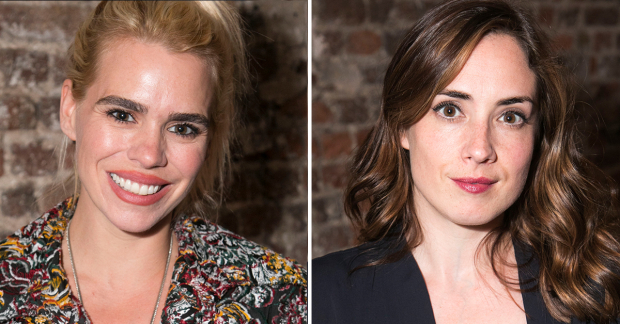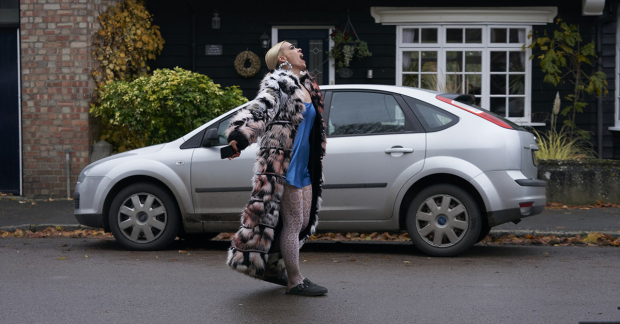Billie Piper and Lucy Prebble discuss I Hate Suzie's theatre roots and what's changed since Call Girl
The pair have teamed up on the hit new series – available in the UK on Sky

© Dan Wooller
Actor Billie Piper and writer Lucy Prebble first worked together on the TV series Secret Diary of a Call Girl. The pair formed a close friendship; after that four-season run was completed, Piper would go on to star in the original London production of Prebble's The Effect at the National Theatre in 2012.
The pair took divergent roads in the years that followed — Piper, most notably, earned a slew of awards and reviews like "a generation's greatest performance" for her truly amazing work in the stage play Yerma, while Prebble began serving as writer and co-executive producer on HBO's equally amazing series Succession and won a Susan Smith Blackburn Prize for her 2019 play A Very Expensive Poison.
For their first work together in almost a decade, Piper and Prebble co-created the blistering dark comedy I Hate Suzie, now streaming on HBO Max. Piper plays Suzie Pickles, a celebrity whose seemingly bucolic life unravels after some very private photos are hacked from her phone and leaked on the internet. The series draws inspiration from Piper's own career — like her portrayer, Suzie is a former popstar who switched careers and gained more notoriety for co-starring on a renowned sci-fi series (for Piper, it was Rose on Doctor Who) — but while the circumstances and emotions are relatable to anyone who has experienced a life-upending trauma, the similarities basically end there.
Piper and Prebble view the show as a natural progression from their Call Girl days. While that show was the result of two people working for a TV network, Suzie is something different: the brutally honest and entirely exciting product of two people calling the shots for themselves.
This conversation has been condensed and edited for clarity.
In terms of intensity alone, I feel like I Hate Suzie is a natural jumping off point from Yerma.
Billie Piper: I think you're right. I think I'm just more intense now.
Lucy Prebble: You and I were talking about the idea for this show then, so there maybe was a cross-over in the emotional intensity.
Piper: If you're enjoying that kind of work, it's quite hard to do anything but that or come to any work without that level of intensity. You just hope you can feel it as much as you did, and fortunately, I was able to.
Obviously, celebrity nude photo leaks have happened in real life — but this is the first show I can think of that has dramatized it. I don't think I've seen it before.
Piper: When we started coming up with ideas, it was quite different. It felt more like a friendship-based show, and we both thought that that had been done. It was Lucy who came up with the idea of the hack.
Lucy: You're right when you say it hasn't been done before. I find it difficult to get excited about ideas that I've already seen, and Billie is the same. I was always surprised that no one had done anything about it, considering what a huge deal it was, a huge act of theft of people's private materials, and we were fascinated by the idea of a woman being exposed. All sides of it: the horror of it and the victimhood of it, but also the fact that she's been hiding for her whole life, living a compartmentalized life filled with performance and anxiety. And Billie always said, if you picked up anybody's phone and it was unlocked and you decided to go looking, most people could have a pretty life-changing experience.

© HBO Max
One of the things I loved most about I Hate Suzie was how vastly different it is from basically everything else that's on TV. It's surreal, it's theatrical, it's like a dream and a nightmare at the same time.
Prebble: Both of us, but Billie particularly, were tired of a certain kind of television where you knew where it was going. There's a massive form that's gotten woven into our bodies. We recognize the rhythm of "Now we're meeting this character" or "Now, things are going wrong." You can almost sing along with it because you've been so exposed to that narrative. Billie is an incredible emotional actress, one of the greats, and I thought about how we could create something that allows us to show every one of those emotions and to feel each of those emotions.
Piper: I really relished working with this particular tone and style. We also lucked out with our directors, Georgi Banks-Davies and Anthony Nielson, who worked so closely with us to fulfill the things that we felt were really important in terms of making everything feel bold and fresh and authentic. It's very hard to achieve that, and it doesn't happen often, so it was a great thrill.
Prebble: We stole a lot of theatre stuff for it; not just in the content, but the form feels very theatrical. What's stopping us from having a fantasy moment right now? When you normally do it, it's kind of pointless narratively or indulgent or pretentious, and we went, "That's fine." We also worked very hard to make it physically affecting. When you're watching it, you're supposed to say, "It's viscerally affecting me." Sometimes, the best way to create that, as you see in horror, is to do something odd. And sometimes that makes people uncomfortable and I get why, but for people who are more theatrical by nature or understand that language, that can be really thrilling.
Do you see a progression in your work from Call Girl to Suzie?
Prebble: I see a massive progression. I'm a better writer than I was then. But honestly, one is what you get when you're an employee at a television company; the other is what you get when artists make what they want to make.
Piper: I second that completely. With Call Girl, we were both really interested in the woman and her story. I think we had the right intentions; we wanted to make something that was thoughtful about that world, because you're only used to seeing one version of that world. But we weren't able or allowed to achieve them in that way, and with age and confidence, we've arrived at something like Suzie.
There's a particularly confrontational scene at a sci-fi convention in an early episode. Billie, was that rooted in any lived experience from your time doing Doctor Who?
Piper: Thank god I've never experienced anything like that. All of my experiences at Q&As and conventions have been incredibly warm. I am overwhelmed at conventions, but for different reasons. People have such enormous emotional responses to you, and I'm not really equipped to handle that. You sort of say, "if you really knew, you wouldn't be crying in front of me right now." [laughs]
This interview originally ran on our lovely sister site TheaterMania.












